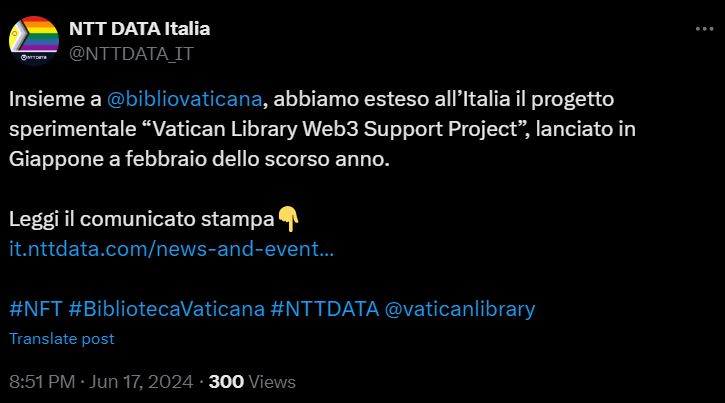Vatican Library Embraces Blockchain to Preserve Manuscripts
The Vatican Library has teamed up with NTT DATA Italia to harness blockchain technology for preserving its extensive collection of manuscripts. This initiative, announced on June 17, is called the "Vatican Library Web3 Support Project" and aims to modernize the library’s outreach by leveraging digital advancements.

Project Overview
The Vatican Library houses approximately 180,000 manuscripts and over 1.5 million printed books. To engage a broader audience, the project will distribute non-fungible tokens (NFTs) to donors and social media users. Initially focused on Italian residents, this experimental phase follows a trial run in Japan that began in February 2023.
NFT Distribution and Benefits
By sharing the project on social media by July 16, participants received a "Silver NFT." This token grants access to a special collection of high-resolution images of 15 manuscripts. Financial supporters are awarded a "Gold NFT," providing access to high-resolution images of all 21 manuscripts in the collection.
Adoption and Impact
To date, 419 users have received Polygon-based NFTs, highlighting blockchain’s role in preserving cultural heritage. These NFTs are soulbound, meaning they are non-transferable and permanently tied to the recipient's digital wallet, ensuring a secure and personal connection to the library’s digital assets.
Future Prospects
The Vatican Library, dating back to the 14th century, has long been a guardian of historical texts. This web3 initiative aligns with its mission to make ancient documents more accessible. In 2020, the library launched a new website with enhanced search functions and easier access to digital reproductions of its vast collection.
The project not only preserves cultural heritage but also aims to explore immersive extended reality (XR) experiences, including augmented and virtual reality, to further engage the public.
NTT DATA Italia Collaboration
NTT DATA Italia has been collaborating with the Vatican Library since 2014. Their digital archive service, AMLAD, preserves over 2 million assets, ensuring the longevity of historic documents. The company has invested heavily in web3 infrastructure and plans to launch a crypto wallet later this year, reinforcing its commitment to the digital future.
Conclusion
The "Vatican Library Web3 Support Project" exemplifies how blockchain technology can enhance the preservation and accessibility of cultural heritage. By engaging a global audience through NFTs and digital innovation, the Vatican Library is setting a precedent for the future of historical preservation.

